八年级英语下册 Unit 1 Have you ever been to an amusement park?Section A学案(无答案) 鲁教版五四制
人教版英语八年级下册Unit 9《Have you ever been to a museum》教学
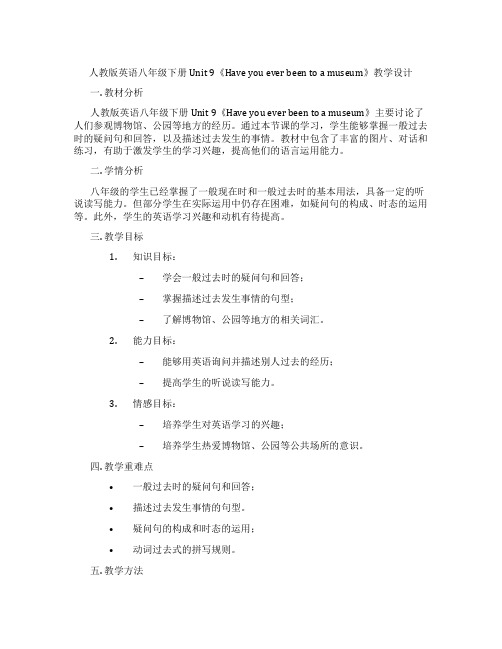
人教版英语八年级下册Unit 9《Have you ever been to a museum》教学设计一. 教材分析人教版英语八年级下册Unit 9《Have you ever been to a museum》主要讨论了人们参观博物馆、公园等地方的经历。
通过本节课的学习,学生能够掌握一般过去时的疑问句和回答,以及描述过去发生的事情。
教材中包含了丰富的图片、对话和练习,有助于激发学生的学习兴趣,提高他们的语言运用能力。
二. 学情分析八年级的学生已经掌握了一般现在时和一般过去时的基本用法,具备一定的听说读写能力。
但部分学生在实际运用中仍存在困难,如疑问句的构成、时态的运用等。
此外,学生的英语学习兴趣和动机有待提高。
三. 教学目标1.知识目标:–学会一般过去时的疑问句和回答;–掌握描述过去发生事情的句型;–了解博物馆、公园等地方的相关词汇。
2.能力目标:–能够用英语询问并描述别人过去的经历;–提高学生的听说读写能力。
3.情感目标:–培养学生对英语学习的兴趣;–培养学生热爱博物馆、公园等公共场所的意识。
四. 教学重难点•一般过去时的疑问句和回答;•描述过去发生事情的句型。
•疑问句的构成和时态的运用;•动词过去式的拼写规则。
五. 教学方法1.情境教学法:通过创设情境,让学生在实际语境中感受和运用英语;2.交际法:鼓励学生参与课堂互动,提高他们的口语表达能力;3.任务型教学法:通过完成任务,培养学生运用英语解决问题的能力;4.游戏教学法:通过趣味游戏,激发学生的学习兴趣。
六. 教学准备1.教学课件:制作课件,包含图片、动画、练习等;2.教学道具:准备相关场所的图片、卡片等;3.音频材料:下载相关听力材料,如录音、歌曲等;4.课堂练习:准备相应的练习题,巩固所学内容。
七. 教学过程1.导入(5分钟)–教师展示一张博物馆的图片,询问学生是否去过博物馆,引导学生谈论自己的经历。
2.呈现(10分钟)–教师展示课件,呈现本节课的主要内容,包括博物馆、公园等地方的词汇以及一般过去时的疑问句和回答。
八年级英语下册:Unit 1 Have you ever been to an amusement
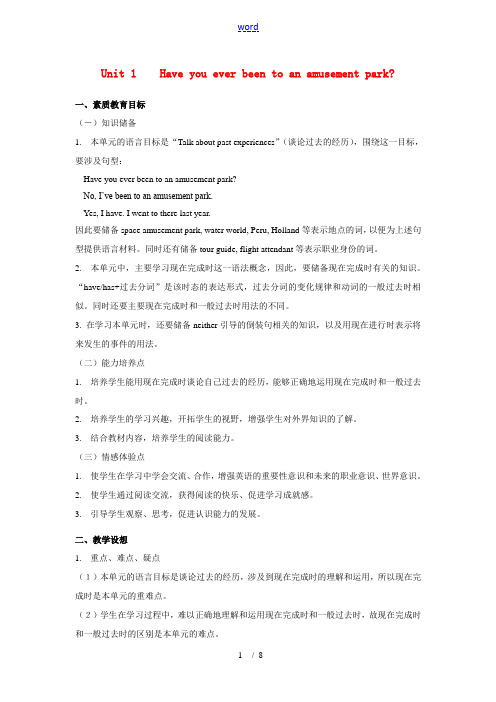
Unit 1 Have you ever been to an amusement park?一、素质教育目标(-)知识储备1.本单元的语言目标是“Talk about past experiences”(谈论过去的经历),围绕这一目标,要涉及句型:---Have you ever been to an amusement park?---No, I’ve been to an amusement park.---Yes, I have. I went to there last year.因此要储备space amusement park, water world, Peru, Holland等表示地点的词,以便为上述句型提供语言材料。
同时还有储备tour guide, flight attendant等表示职业身份的词。
2.本单元中,主要学习现在完成时这一语法概念,因此,要储备现在完成时有关的知识。
“have/has+过去分词”是该时态的表达形式,过去分词的变化规律和动词的一般过去时相似。
同时还要主要现在完成时和一般过去时用法的不同。
3. 在学习本单元时,还要储备neither引导的倒装句相关的知识,以及用现在进行时表示将来发生的事件的用法。
(二)能力培养点1.培养学生能用现在完成时谈论自己过去的经历,能够正确地运用现在完成时和一般过去时。
2.培养学生的学习兴趣,开拓学生的视野,增强学生对外界知识的了解。
3.结合教材内容,培养学生的阅读能力。
(三)情感体验点1.使学生在学习中学会交流、合作,增强英语的重要性意识和未来的职业意识、世界意识。
2.使学生通过阅读交流,获得阅读的快乐、促进学习成就感。
3.引导学生观察、思考,促进认识能力的发展。
二、教学设想1.重点、难点、疑点(1)本单元的语言目标是谈论过去的经历,涉及到现在完成时的理解和运用,所以现在完成时是本单元的重难点。
(2)学生在学习过程中,难以正确地理解和运用现在完成时和一般过去时,故现在完成时和一般过去时的区别是本单元的难点。
英语人教版八年级下册Have you ever been to a museum

Exercise.
1. He has studied English for 4 years. (改为一般疑问句) _______ he _______ English for 4 years? 2. My parents have been to America. (对画线部分提问) _____ _____ _____ parents _____? 3. Lucy has traveled to another province. (改为否定句) Lucy ____ ____ to another province.
Have/has been to// have/has gone to
• Have (has) been to 表示“曾经去过某地”, 说话时已不在去过的地方。(去过) • Have (has) gone to 表示 “已经到某地去 了”,不在说话的地方。(去了) • Eg: I have been to Shanghai.我去过上海。 • She has gone to Wuhan. 她到武汉去了。 • He _________to Beijing. So he isn’t here. • I __________to the zoo many times.
• He has been to a science museum,_____ _____./_______ _______ _______.(我也是) • They haven’t been to a history museum,_______ _______./_______ ______ _______.(我也是) • me, too./ so have I. • me,neither./ neither have I.
完整版新人教版八年级下册英语课文翻译

《完整版新人教版八年级下册英语课文翻译》一、Unit 1 What's the matter?Section A1.1 —What's the matter with you, Peter?——彼得,你怎么了?—My back hurts.——我的背疼。
1.2 —What's the matter with your leg?——你的腿怎么了?—I think it might be broken.——我觉得可能是骨折了。
Section B2.1 —Can you help me, please?——请问你能帮我一下吗?—Sure, what's the matter?——当然,怎么了?2.2 —I have a toothache.——我牙疼。
—You should see a dentist.——你应该去看牙医。
二、Unit 2 I'll help to clean up the city parks.Section A3.1 —Why do you want to volunteer?——你为什么想当志愿者?——我想为我的社区做出贡献。
3.2 —What can we do to help?——我们能做些什么来帮忙?—We can plant trees and flowers to make the city more beautiful.——我们可以种树和花,让城市变得更加美丽。
Section C4.1 —Do you often volunteer at the animal center?——你经常在动物中心做志愿者吗?—Yes, I do. I love animals and I want to take care of them.——是的,我经常去。
我爱动物,我想照顾它们。
4.2 —What did you do last weekend?——你上周末做了什么?—I helped to clean up a park with my friends.——我和朋友们帮忙清理了一个公园。
英语人教版八年级下册9 Have you ever been to ...

B: Yes, I have.
A: Have you tried Beijing Duck? B: Yes, I love them very much.
4a. Put the correct forms of the verbs in the blanks.
1. A: Do you want __________ to come (come) to the space museum? B: No, I’ve already ______ been (be) there three times. 2. A: Have you ________ (see) the robots at the seen science museum? B: Yes, I ______ went (go) there last weekend.
A: Have you visited Beijing ?
B: Yes, I went there last summer.
A: Have you been to the Palace Museum ?
B: Of course. It was fantastic.
A: Have you seen Qianqing Gong?
3. A: Let’s ________ spend (spend) the day at the zoo. B: Well, I’ve already _______ been (be) there a couple of times, but I’m happy______ to go (go) again. 4. A: How about _________ (go) to the art going museum? There are some special German paintings there right now. B: Sure. When do you want _______ to go (go) ? 5. A: Have you ever _________ (visit) the visited history museum? B: No, I’ve never________ (be) there. been
八年级英语Have-you-ever-been-to课件1

Grammar focus
1.Have you ever been to an aquarium?
你曾去过水族馆么?
Yes, I’ve been to an aquarium. No, I haven’t. No, I’ve never been to an aquarium.
Conversation 3 玩的愉快 Harvey had a great time at Water World.
TF
Harvey’s friend has never been to Water World. T F
Harvey and his friend are going skating.
RIVER THEATER PARK
CITY LIBRARY
FUN TIMES AMUSEMENT PARK
SPACE MUSEUM
ZOO AQUARIUM
2b Listen again and circle T (for true) or F (for false).
Conversation 1 Tina went to the space museum last year. John has never been to the space museum. They are going to take the subway.
A: Have you ever been to an aquarium? B: No, I haven’t. How about you? A: …
2a Look at the map of the town. Listen and circle
the places you hear. WATER WORLD
鲁教版八年级下册英语知识点

Unit 1 Have you ever been to an amusement park?⼀..重点难点释义1. Me neither=Neither have I . 我也没去过。
(1)英语中表⽰后者与前者情形相同,“也不……”时,常⽤neither引起的倒装句Neither+助动词/系动词be/情态动词+主语。
eg:--I'm not tall. Neither is she. =She's not tall, either. 我个⼦不⾼,她个⼦也不⾼。
--They can't cook. Neither can we. =We can't cook, either. 他们不会做饭,我们也不会。
(2)如果表⽰后者与前者情形相同,“也……”常⽤so引起的倒装句, so+助动词/系动词be/情态动词+主语。
eg:--My friends are happy. So am I.=I'm happy, too./I'm also happy. --They will leave by air. So will you. =You will also leave by air. 2 hear, hear of, hear from*hear 为动词,有听见和听说之意。
作“听见”解,只强调结果。
作为:“听说”解,其后⼀般跟从句。
**hear of 听说,听到,其后跟名词或从句。
--My grandma can't hear very well. --I hear that they miss us very much. --I heard him singing in the next room. --Have you ever heard of Edison? 3. be famous for ,be famous as与be famous to**be famous for 因为……⽽出名/,for后接表⽰特点、特长的名词,表⽰⼈或物闻名的原因 --The village is famous for its green tea.**be famous as 以……⾝份出名,as后⼀般接表⽰职业的名词。
八下新目标英语Unit_9_Have_you_ever_been_to_a_museum?

【2012贵州贵阳】 “Have you ever been to Tokyo?” “Yes, I ______ there twice. It’s a modern city.”
A. have gone B. have been C. had gone
【答案】B
考查动词时态及动词的用法。问句用的是现 在完成时,答句也应该用现在完成时,前后 时态一致。have gone意为“去过,但还没回 来”;have been意为“去了,回来了”。根 据句意:你去过东京吗?我去过两次,它是 一个现代城市。故选B.
the final.
— I think so. He ________ for it for months.
A. is preparing
B. was preparing
C. had been preparing
D. has been preparing
2. By the time he realizes he _________ into a
D. Did; show
8. — Hi, Tracy, you look pale.
— I am tired. I ______ the living room all day.
A. painted
B. had painted
C. have been painting D. have painted
C. considered D. is going to consider
7. —______ you ______ him around the museum
yet?
—Yes. We had a great time there.
A. Have ; shown
新人教版八年级英语下册 Uni Have you ever been to a museum全单元

精选课件
15
Amy: I’ve recently been to a very unusual museum in India, the International Museum of Toilets. I just couldn’t believe my eyes when I saw so many different kinds of toilets there. The museum
Conversation 1
1. Tina went to the space museum last year. T/F 2. John has never been to the space museum. T/F 3. They are going to take the subway. T/F
精选课件
10
2c. Look at the map in 2a and make conversations about the places.
A: Have you ever been to the space museum? B: Yes, I have. How about you? A: No, I haven’t. B: Oh, it’s fantastic. Let’s go tomorrow. A: OK. How are we going to get there? B: We can take the subway.
They have information about
different computers and who invented them. The
old computers were much bigger. It’s unbelievable
初二英语Unit Have you ever been to a museum?试题

初二英语Unit Have you ever been to a museum?试题1. My uncle has two pet dogs.But________of them is friendly to me.A.eachB.neitherC.eitherD.both【答案】B【解析】由句意“我叔叔养了两只宠物狗,但没有一只对我友好”可知选B。
neither表示“两者都不”。
2. He jumped into the river to save the drowning girl.He was so________.A.afraidB.scaredC.braveD.bored【答案】C【解析】题干中提到“他跳进河里去救那个溺水的女孩”,由此可知他很勇敢。
故所缺的词是brave。
3.—________,Mary?—I have a lot of trouble________the newspaper.A.What’s wrong;readingB.What’s the matter;to readC.What’s matter;readingD.What’s the wrong;to read【答案】A【解析】询问“怎么了”要用What’s wrong?或What’s the matter?先排除C和D;have trouble后若跟动词,只能跟动词-ing形式,故答案为A。
4.I have been to the Space Museum.(对画线部分提问)________ ________you________?【答案】Where have;been【解析】画线部分为地点状语,所以用where提问。
5. Neither this answer nor that one is right.(改为同义句)________ ________the answers________right.【答案】Neither of;is【解析】neither作主语,谓语动词用第三人称单数形式。
have you ever been to an amusement park八年级英语下册Unit_9

water park
zoo
Have you ever been to…? Yes, I have. / haven’ No, I haven’t.
a quarium a space museum Have you ever been to…?
1.have (has) been to 表示“曾经去过某地”, 意思是过去某个时候去过,现在并没有在那个 地方。与次数,just ,never, ever 连用。 She has been to Shanghai three times.(她已经不 在上海,只说明她曾经去过。) I have ever been to Singapore before. We’ve never been to Japan.
“已经”通常用于肯定句中,放在句中。 已经”通常用于肯定句中 放在句中。 放在句中 already: I have already read this book. 有时,也用在疑问句中表示惊讶。 有时,也用在疑问句中表示惊讶。 Have you eaten up all the food already ?
= neither can she.
注意区别: so+助动词+主语 完全倒装,表示 “也……”用在肯定句中 Mary has gone to Singapore. So has Emily. Mary去新加坡了。Emily也去了。 I’ve been collecting kites for two yest do it now,so must you. 你也必须.
1. My father bought many books for me yesterday . Now , I have a lot to read because my father has bought many books for me. ________________________________ 2. I saw this film last week. Now, I know this film because have seen it before I_____________________. 3. I did my homework yesterday. Now, I can give it to the teacher because I______________ have done it.
八年级下册英语现在完成时知识讲解 already,yet,ever,just
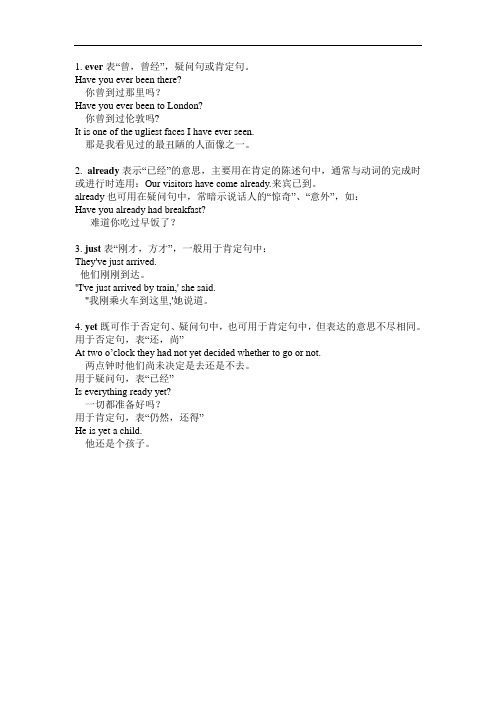
1. ever表“曾,曾经”,疑问句或肯定句。
Have you ever been there?
你曾到过那里吗?
Have you ever been to London?
你曾到过伦敦吗?
It is one of the ugliest faces I have ever seen.
那是我看见过的最丑陋的人面像之一。
2. already表示“已经”的意思,主要用在肯定的陈述句中,通常与动词的完成时或进行时连用:Our visitors have come already.来宾已到。
already也可用在疑问句中,常暗示说话人的“惊奇”、“意外”,如:
Have you already had breakfast?
难道你吃过早饭了?
3. just表“刚才,方才”,一般用于肯定句中:
They've just arrived.
他们刚刚到达。
"I've just arrived by train,' she said.
"我刚乘火车到这里,'她说道。
4. yet既可作于否定句、疑问句中,也可用于肯定句中,但表达的意思不尽相同。
用于否定句,表“还,尚”
At two o’clock they had not yet decided whether to go or not.
两点钟时他们尚未决定是去还是不去。
用于疑问句,表“已经”
Is everything ready yet?
一切都准备好吗?
用于肯定句,表“仍然,还得”
He is yet a child.
他还是个孩子。
【人教英语】八下Unit 9 Have you ever been to a museum课文重难点详解 Section A
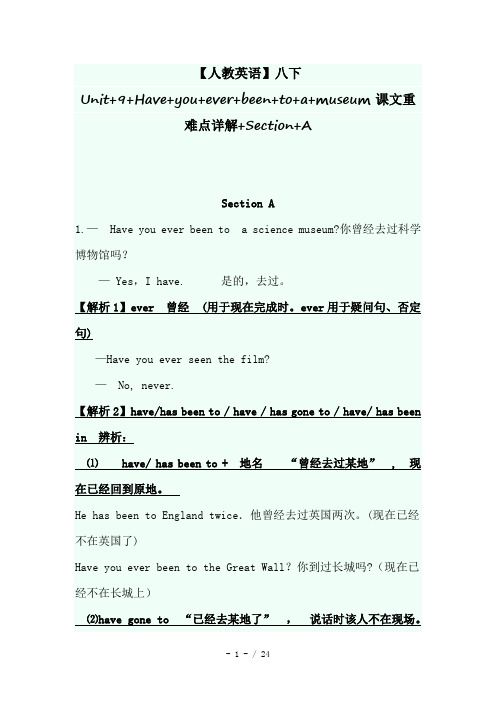
【人教英语】八下Unit+9+Have+you+ever+been+to+a+museum课文重难点详解+Section+ASection A1.—Have you ever been to a science museum?你曾经去过科学博物馆吗?— Yes,I have. 是的,去过。
【解析1】ever 曾经(用于现在完成时。
ever用于疑问句、否定句)—Have you ever seen the film?—No, never.【解析2】have/has been to / have / has gone to / have/ has been in 辨析:⑴have/ has been to + 地名“曾经去过某地”, 现在已经回到原地。
He has been to England twice.他曾经去过英国两次。
(现在已经不在英国了)Have you ever been to the Great Wall?你到过长城吗?(现在已经不在长城上)⑵have gone to“已经去某地了”,说话时该人不在现场。
He has gone to England。
他已去英国了。
(已经不在说话的地方,到达英国或者在去英国的路上)( ) Mary isn’t here. She has ____ the shop.A. been toB. went toC. gone toD. /【2013江苏中考1】A number of tourists ____ Yangzhou many times because it is such a beautiful city.A. have been toB. has been toC. has gone toD. have gone to⑶have been in +地点待在某地,常与时间段搭配。
I have been in Shanghai for three years.2. Me neither 我也没有。
鲁教版八年级英语下册1-3单元重点词汇、句型
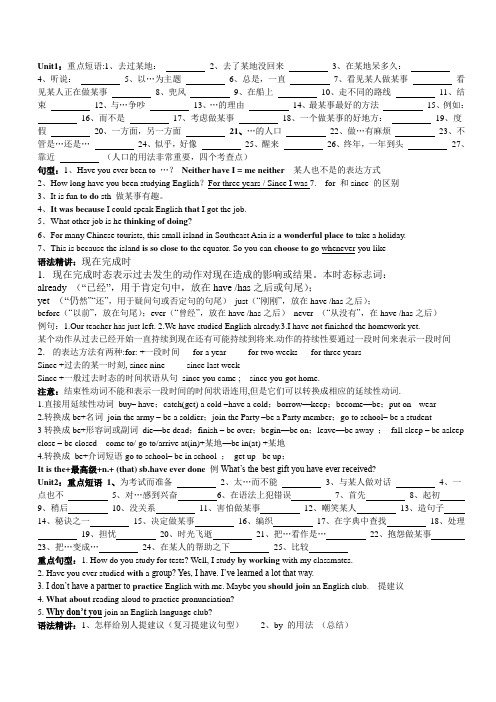
Unit1:重点短语:1、去过某地:2、去了某地没回来3、在某地呆多久:4、听说:5、以…为主题6、总是,一直7、看见某人做某事看见某人正在做某事8、兜风9、在船上10、走不同的路线11、结束12、与…争吵13、…的理由14、最某事最好的方法15、例如:16、而不是17、考虑做某事18、一个做某事的好地方:19、度假20、一方面,另一方面21、…的人口22、做…有麻烦23、不管是…还是…24、似乎,好像25、醒来26、终年,一年到头27、靠近(人口的用法非常重要,四个考查点)句型:1、Have you ever been to …?Neither have I = me neither 某人也不是的表达方式2、How long have you been studying English?For three years / Since I was 7. for 和since 的区别3、It is fun to do sth 做某事有趣。
4、It was because I could speak English that I got the job.5、What other job is he thinking of doing?6、For many Chinese tourists, this small island in Southeast Asia is a wonderful place to take a holiday.7、This is because the island is so close to the equator. So you can choose to go whenever you like语法精讲:现在完成时1.现在完成时态表示过去发生的动作对现在造成的影响或结果。
本时态标志词:already (―已经‖,用于肯定句中,放在have /has之后或句尾);yet (―仍然‖―还‖,用于疑问句或否定句的句尾)just(―刚刚‖,放在have /has之后);before(―以前‖,放在句尾);ever(―曾经‖,放在have /has之后)never (―从没有‖,在have /has之后)例句:1.Our teacher has just left. 2.We have studied English already.3.I have not finished the homework yet.某个动作从过去已经开始一直持续到现在还有可能持续到将来.动作的持续性要通过一段时间来表示一段时间2.的表达方法有两种:for: +一段时间for a year for two weeks for three yearsSince +过去的某一时刻, since nine since last weekSince +一般过去时态的时间状语从句since you came ; since you got home.注意:结束性动词不能和表示一段时间的时间状语连用,但是它们可以转换成相应的延续性动词.1.直接用延续性动词buy– have;catch(get) a cold –have a cold;borrow—keep;become—be;put on-- wear2.转换成be+名词join the army – be a soldier;join the Party –be a Party member;go to school– be a student3转换成be+形容词或副词die—be dead;finish – be over;begin—be on;leave—be away ;fall sleep – be asleep close – be closed come to/ go to/arrive at(in)+某地—be in(at) +某地4.转换成be+介词短语go to school– be in school ;get up_ be up;It is the+最高级+n.+ (that) sb.have ever done 例What’s the best gift you have ever received?Unit2:重点短语1、为考试而准备2、太…而不能3、与某人做对话4、一点也不5、对…感到兴奋6、在语法上犯错误7、首先8、起初9、稍后10、没关系11、害怕做某事12、嘲笑某人13、造句子14、秘诀之一15、决定做某事16、编织17、在字典中查找18、处理19、担忧20、时光飞逝21、把…看作是…22、抱怨做某事23、把…变成…24、在某人的帮助之下25、比较重点句型:1. How do you study for tests? Well, I study by working with my classmates.2. Have you ever studied with a group? Yes, I have. I’ve learned a lot that way.3. I don’t have a partner to practice English with me. Maybe you should join an English club. 提建议4. What about reading aloud to practice pronunciation?5. Why don’t you join an English language club?语法精讲:1、怎样给别人提建议(复习提建议句型)2、by 的用法(总结)Unit 3 重点短语:1、过去常常习惯于被用来做2、害怕(多种表达)3、对…感兴趣4、去睡觉5、四个花费用法6、不再(两种)7、几乎不8、带某人去9、支付得起10、最后11、做出一个决定12、令某人吃惊13、即使14、以…为骄傲(两种)15、注意、留心16、放弃重点句型:1、I used to be afraid of the dark。
Have you ever been to a museum_知识点汇总-人教版英语八年级下册

Unit 9 Have you ever been to a museum?一、短语归纳1.science museum科学博物馆2.history museum历史博物馆3.space museum 太空博物馆4.art museum美术馆5.water park水上公园6.amusement park游乐场7.somewhere different某个不同的地方8.have a great time玩得高兴9.take the subway乘地铁10. learn about了解11.put up搭建;支起12. color movies彩色电影13. a great way to do sth一个做某事的好方式/好方法14.in such a rapid way用如此快速的方式15.It’s unbelievable that:很难相信16.be able to do sth能够做某事17.think about 考虑18.many different kinds of许多不同种类的19. in the future在将来未来20. a couple of 少数;几个21.a perfect cup of tea一杯完美的茶22. something important重要的东西23.thousands of数以千计的24. watch sb. do sth观看某人做了某事25.want to do sth想要做某事26.encourage sb. to do sth鼓励某人做某事27.love doing sth喜欢做某事28.see sb doing sth看见某人正在做某事29.the best time to do sth做某事的最佳时间30.have problems (in) doing sth做某事有困难31. choose to do sth选择做某事32. tell sb. to do sth告诉某人做某事33.take a holiday度假34. at night 在晚上35. more than 超过;多于36.three quarters 四分之三37. on the one hand…on the other hand 一方面…另一方面38. an English-speaking country一个说英语的国家39. during the daytime 在白天40. wake up 醒来41. all year around一年到头42.close to靠近43. far from离…远44. the Great Wall长城45.the best time to do sth做某事的最好方式考点归纳考点1 辨析:have/ has been to have gone to have been in⑴have/ has been to + 地名“曾经去过某地” , 现在已经回到原地。
八年级英语下册 Unit 1 Have you ever been to an amusement
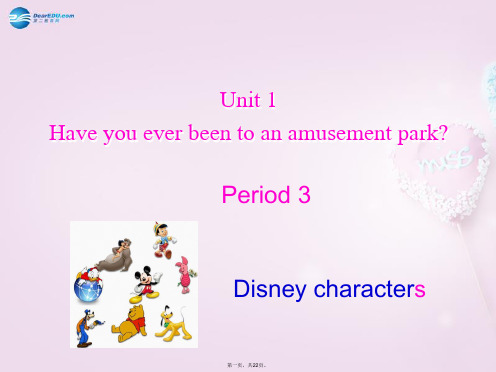
Disney Cruise
What can we do on board?
1. We cans_le_e_p__a_nd__e_a_t _o_n_b_o_a_rd_____. 2. _W__e__c_a_n_s_h_o_p_________________. 3. __W_e__c_a_n__g_o_t_o_D__is_n_e_y__p_a_r_ti_e_s__.
end up in the same place. That is Disney’s own
island. 结束于It i,s终ju止st于so much fun in Disneyland!
岛屿
你可以在船上游览(yóulǎn)几天,可以在船上睡觉、 吃饭。
第十六页,共22页。
Have you ever … a Disney Cruise? These are … that also have …. You can … for several days, and you can .... There are also …on board, just like ….
B: What’s that?
A: It’s like Disneyland, but it’s on a boat.
B: Why do you want to go on that? A: Well, you can travel to Disney’s own island.
第二十二页,共22页。
Snow White
Sleeping Beauty
The Lion King
第七页,共22页。
Nimu
Mickey House
第八页,共22页。
Donald’s Boat
人教新版初中八年级下册英语Haveyoueverbeentoamuseum单元测试题(含答案)2
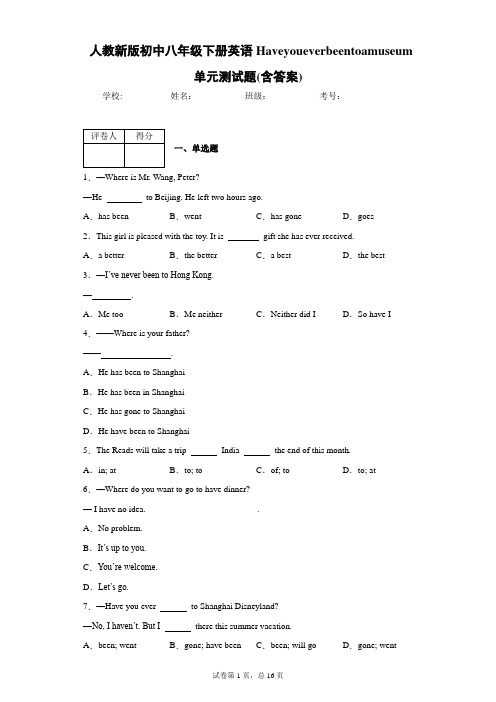
人教新版初中八年级下册英语Haveyoueverbeentoamuseum单元测试题(含答案)学校:___________姓名:___________班级:___________考号:___________一、单选题1.—Where is Mr. Wang, Peter?—He to Beijing. He left two hours ago.A.has been B.went C.has gone D.goes2.This girl is pleased with the toy. It is gift she has ever received.A.a better B.the better C.a best D.the best 3.—I’ve never been to Hong Kong.—.A.Me too B.Me neither C.Neither did I D.So have I 4.——Where is your father?——.A.He has been to ShanghaiB.He has been in ShanghaiC.He has gone to ShanghaiD.He have been to Shanghai5.The Reads will take a trip India the end of this month.A.in; at B.to; to C.of; to D.to; at 6.—Where do you want to go to have dinner?— I have no idea. _________________________.A.No problem.B.It’s up to you.C.You’re welcome.D.Let’s go.7.—Have you ever to Shanghai Disneyland?—No, I haven’t. But I there this summer vacation.A.been; went B.gone; have been C.been; will go D.gone; went8.Tom has been to Beijing before. .A.So does Jack B.So has Jack C.So is Jack D.So Jack is 9.—Dad! Where is Mom?—She the supermarket.A.has been to B.has gone to C.is going to D.went to 10.Kate has never seen Chinese films, ?A.hasn’t she B.has she C.is she 11.—Where is Zhang Hua?—He Beijing to see his parents and he’ll be back tomorrow.A.has gone to B.has been in C.has been to 12.—Come to my home and let’s have tea you are free, Mark.—Sure, I will.A.whatever B.whenever C.wherever D.however 13.I was born here, so I had no problem the bus station.A.find B.to look C.look D.finding 14.—Mom, of the apples gone bad.—We’d better eat up the rest as soon as possible.A.two third; have B.two thirds; haveC.one third; has D.one third; has15.—you the film yet?—Yes, I it last month.A.Did; see; saw B.Have; seen; have seen C.Have; seen; saw D.Did; see; have seen16.—I have ________ been to Tibet. How about you?—Me. neither.A.never B.ever C.already 17.—Are Betty and her husband still living in Beijing?—No, they to Qingdao.A.will move B.are moved C.have just moved D.moved 18.—Do you think our city a lot since ten years ago?—Yes, the road is wider and the buildings are more and higher.A.changed B.has changed C.changes D.will change19.Mary’s never been here before, she?A.do B.was C.does D.has 20.—Are you clear about the job of a policeman, Ben?—Yes, to keep people ________ and the society in good order.A.busy B.safeC.lucky D.healthy21.To my surprise, my brother can speak English .A.lively B.perfectly C.badly D.friendly 22.Few of the students were hurt in the accident, ?A.weren’t they B.were they C.did they D.didn’t they 23.—There many foreign students in her class.—Yes. I know two of them are .A.are; Japanese B.is; AustralianC.are; Germany D.is; American24.—Did you hear the shouts the girl?—Yes. I found her looking at a snake fear.A.from; in B.from; at C.at; with D.in; in 25.She has picture that no one could keep their eyes off it.A.so a beautiful B.such a beautiful C.so beautiful D.such a beautifully二、补全短文5选5阅读短文,根据短文内容,从短文后的五个选项中选出能填入空白处的最佳选项。
八年级英语下册U1Haveyoueverbeento单元时态专练目标试题

U1 Have you ever been to单元时态专练制卷人:打自企;成别使;而都那。
审核人:众闪壹;春壹阑;各厅……日期:2022年二月八日。
姓名 _____________ 班级_______ 得分________I、单项选择 (60分)1.Listen! Some of the girls ____ about Harry Potter.A. are talkingB. talkC. were talkingD. talked2. She will have a holiday as soon as she ____ the work next week.A. finishesB. doesn’t finishC. will finishD. won’t finish3. -Where’s Jim?-He ______ to the shop. He’ll be back in an hour.A. goesB. goC. has goneD. will go4.Our teacher, Miss Chen, _____English on the radio the daybefore yesterday.A. teachesB. taughtC. will teachD. had taught5. I don’t think I_______ you in that dress before.A. have seenB. seeingC. sawD. see6. -Is your father in?-No, he _______ for three hours.A. was notB. has been outC. went outD. has gone out7. There _______ a football game this afternoon.A. will haveB. is going to beC. hasD. are going to be8. What ________ you _______ when I rang you up.A. are; doingB. were; doingC. do; doD. have; done9.Both his parents look sad. Maybe they ____what's happened to him .A. knewB. have knownC. must knowD. will know10. He has _____ been to Shanghai, has he ?A. alreadyB. neverC. everD. still11. Have you met Mr Li ______?A. justB. agoC. beforeD. a moment ago12. The famous writer ____ one new book in the past two years.A. is writingB. was writingC. wroteD. has written14. Zhao Lan ___already ___in this school for two years.A. was; studyingB. will; studyC. has ; studiedD. are; studying15. We _____ Xiao Li since she was a little girl.A. knowB. had knownC. have knownD. knew16. Harry Potter is a very nice film. I ____ it twice .A. will seeB. have seenC. sawD. see17. —These farmers have been to the United States.—Really? When ___ there?A. will they goB. did they goC. do they goD. have they gone18. — ______ you _____ your homework yet ?—Yes. I _____ it a moment ago.A. Did; do; finishedB. Have; done; finishedC. Have; done; have finishedD. will; do; finish19. His father ______ the Party since 1978.A. joinedB. has joinedC. was inD. has been in20. —Do you know him well ?— Sure. We _____ friends since ten years ago.A. wereB. have beenC. have becomeD. have made21. —How long have you ____ here ?—About two months.A. beenB. goneC. comeD. arrived23. The factory _____ since 1987.A. openedB. has openedC. was openedD. has been open24. I’ll lend you my bike, but you can only ___ it for two days.A. borrowB. lendC. keepD. take25. It _____ ten years since he left the army.A. isB. hasC. willD. was26. Miss Green isn‘t in the off ice. she____ to the library.A. has goneB. wentC. will goD. has been27. My parents _____ Shandong for ten years.A. have been inB. have been toC. have gone toD. have been28. My father _____ Shanghai twice.A. has been toB. has been inC. has gone toD. has gone in29. While I _____ in Beijing, it was raining hard.A. gotB. reachedC. arrivedD. was30. Miss Gao _____ this school since 1996.A. has come toB. came toC. has been inD. has taughtII、用所给单词的适当形式填空。
- 1、下载文档前请自行甄别文档内容的完整性,平台不提供额外的编辑、内容补充、找答案等附加服务。
- 2、"仅部分预览"的文档,不可在线预览部分如存在完整性等问题,可反馈申请退款(可完整预览的文档不适用该条件!)。
- 3、如文档侵犯您的权益,请联系客服反馈,我们会尽快为您处理(人工客服工作时间:9:00-18:30)。
Unit 1 Have you ever been to an amusement park?Section A 一.Teacher’s words: Where there is a will, there is a way.二. 学习目标1、Knowledge aims :New words: neither, seen, island, especiallyDrills: --Have you ever been to an aquarium ?--Yes, I’ve been to an aquarium ./No ,I haven’t ./ Neither have I .No ,I’ve never been to an aquarium ./I’ve never been to a water park .2、Ability aims:1)如何表达现在完成时。
2)现在完成时,一般过去时和现在进行时表将来的用法。
3、Emotion aim :描述曾经去过哪些有趣的地方,开拓视野陶冶情操。
三. 教学重难点教学重点:现在完成时态。
教学难点:1.so和neither的区别。
2.have been to sw 与have gone to sw 的区别。
四.学习过程Step1预习导学及自测:翻译官,试试看1.在船上 ______2.space museum _____3.一年到头 _____4.all the time ______5.四分之三 _____6.take a ride _____7.听说 _____ 8.an English-speaking country _________Step2情景导入:教师提出Have you ever been to ···?引导学生回答,并教学生词Step3自主探究:1a.Write your ideas .1b.Listen & check.2a.Listen & circle the places you hear.2b.Listen again & circle T or F.Step4 合作交流Ⅰ 现在完成时的用法1.表示过去发生的或已经完成的某一动作对现在造成的影响或结果。
2.表示过去已经开始,持续到现在动作或状态,可以和表示从过去某一时刻延续到现在(包括“现在”在内)的一段时间的状语连用。
Ⅱ 现在完成时态的结构have (has)+过去分词构成:主语 + have/has + 过去分词 + 其他。
( 当主语是第三人称单数时用has,其余人称用have。
)否定式:主语 + haven't/hasn't + 过去分词 + 其他。
疑问式: Have /Has + 主语 + 过去分词 + 其他?肯定答语: Yes, 主语 + have/has. 否定答语:No, 主语 + haven't/ha sn't.过去分词:规则动词的过去分词构成与动词过去式相同;不规则动词需要特殊记忆.Ⅲ 和现在完成时态连用的时间副词或短语:1.already,yet,ever,never,just,be fore2.once,twice,three times, four times3.for + 一段时间,since +时间段4.these days, today, this year, so far ,in the last past two yearsⅣ 现在完成时态使用的注意事项:1. 表示过去发生的动作或存在状态,一直持续到现在,也许还将继续下去,可以和for+时间段,since+时间点/从句及how long 连用,谓语动词只可用延续性动词。
常见的终止性动词与延续性动词之间的对应关系如下:come/go/ arrive/reach/get /move to ----be in /at die ----- be dead open------be open close ---be closed become -----be fall asleep ------be asleep borrow ----keep buy----have begin ,start ----- be on put on -----wearleave -----be away from join the army -----be in the army /be a soldier join theParty ---be in the Party / be in the Party注意:have/has been与have/has gone区别(见课本)例:他去过长城。
_____________________________________—他在哪儿?______________________—他去长城了。
___________________________2. 瞬间动词在完成时态中的否定式可以接一段时间。
Step5 Listening (2a, 2b)2a Get the students to look at the map of the town. Then listen and circle the placesthey hear.2b Let the students listen and circle T (for true) or F (for false).Step6 PracticeStep7 典型例题解析1.____ of my parents enjoys music.A. BothB. NeitherC. AllD. Every[解析] 选B。
有句中谓语动词enjoys说明该句的主语必须是单数,故排除A, C两项。
Every不能和of连用,因而只能选B。
neither of…作主语时谓语动词用单数。
2.Digital cameras a re becoming more and more popular , but somestill _____ too much.A. payB. spendC. takeD. cost[解析] 选D。
pay, spend, take, cost 均可表示“花费”,但其用法各不相同。
cost 应以物做主语,而spend 则以人做主语;take做“花费”解时,常用于It takes sb. some timeto do sth. 句式结构中; pay常用于pay for 结构中。
本句的some 指 digital cameras,指“物”,故选D。
3.-- Why is your mother’s English so good?--Because she__ New York for six years.A. has gone toB. has been inC. has come toD. has been to[解析] 表示“在某地居住多久”用have/has been in/at+ 地点,本题根据“在纽约六年”可知,应用 has been in。
故选B。
Step8中考链接1.(2009年洛江)The programmer “Xiuhu Stories ”_on Yiwu TV twice a weekA. is shown B showed C will show . D is showing2.(2009年义乌)Wow! Ther e are so many books. I really can’t decide __.A. where to buyB. which to buyC. what to buyD. how to buyStep9小结回扣:Let students read and memorize the important words and sentences. Thenthe teacher can explain the difficult points if necessary.【当堂达标】一.写出下面动词的过去式和过去分词。
1. go _______ ________2. study _________ _________3. have _______ ________4. be _________ _________5. cut _______ ________6. buy _________ _________7. live _______ ________ 8. begin _________ _________9. break_______ ________ 10.finish_________ _________二. 单项选择1. —Have you ever been to an aquarium? —No, _____.A. I haveB. I am notC. I haven’tD. I hasn’t2. —I’ve never been to a water park. — _______A. Me, tooB. Me, neither.C. Me also.D. Me both.3. Has the train _____ yet?A. got toB. reachedC. arrivedD. arrived at4.The teacher asked _____.A. what’s your nameB. what was your nameC. what your name isD. what your name was5.—Do you mind if I stay here a little longer? —_____.A. No, you can’tB. Yes, you mayC. Certainly notD. Yes, not at all6.How long has his br other _____ the book?A. keptB. boughtC. lentD. borrowed7.I’ve never seen such a fine picture _____.A. agoB. be foreC. yetD. later8.—Has the foreigner been to many interesting places in Beijing?—Yes, but he has not _____been to many other parts of China.A. alreadyB. stillC. yetD. never三.Complete the dialogue.Jack: Hi, Tom. I _____ _____you for a long time. Where _____ you _____?Tom: I _____ _____ to Xi’an.Jack: Really? How _____ you _____ there?Tom: By _____.Jack:_____ _____did it take you to fly there? Tom: Less _____ two hours.Jack:_____ _____did you go there?Tom: I _____ there _____ a holiday.Jack: Did you _____ a good time there?Tom: Yes, I _____ myself very much.Jack: I’m very _____ _____ hear that.Tom:_____ a lot.六.课后反思。
